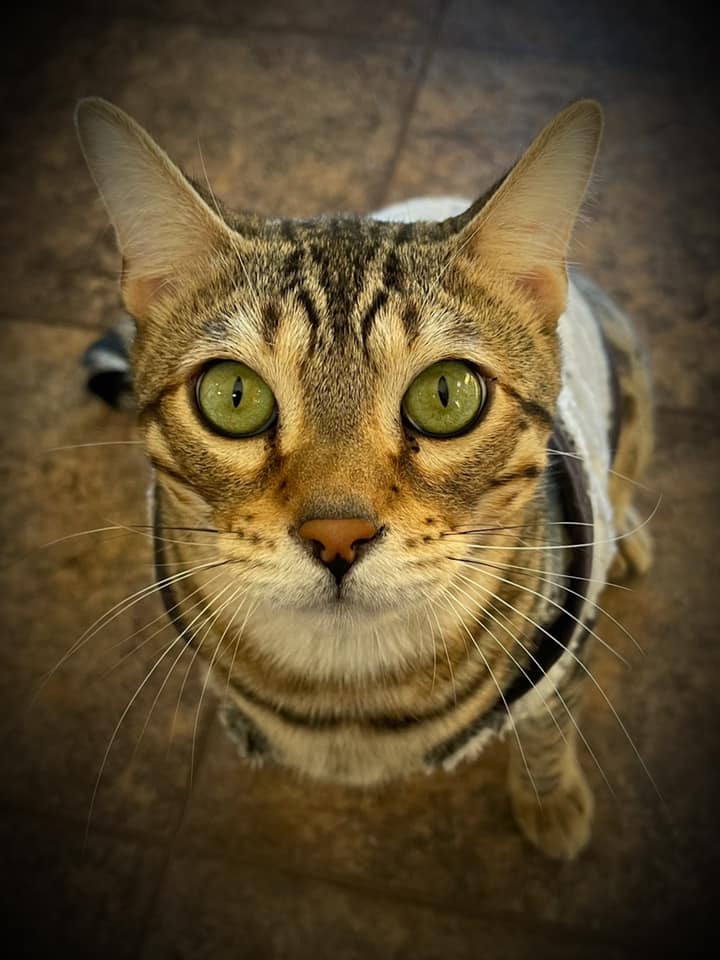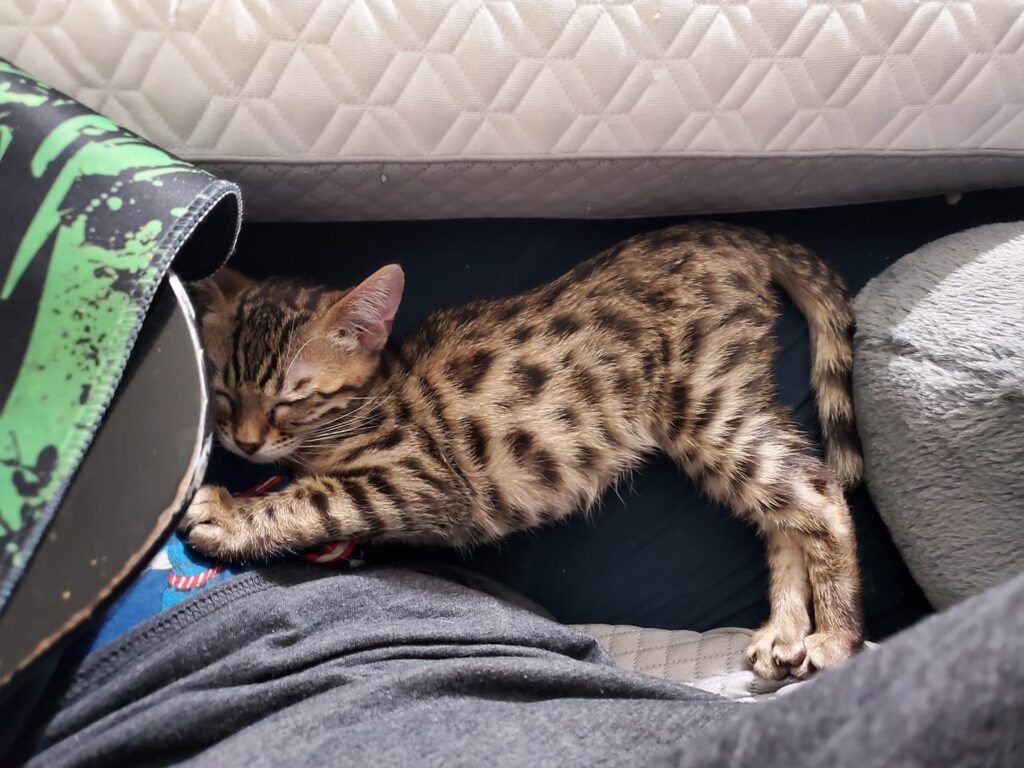
How to Keep a Bengal Cat in Good Health
Maintaining a Bengal cat’s health starts with proactive prevention of diseases, viruses, and intestinal parasites. Like all breeds, Bengals have certain genetic and health vulnerabilities that require careful attention.
Responsible breeders are key to safeguarding the breed’s well-being. They conduct thorough testing for both hereditary and viral conditions in their breeding cats, helping to strengthen the overall health and longevity of Bengal lines. For pet owners, these tests are usually not needed unless the kitten shows signs of illness—but this makes selecting a reputable breeder even more important.

Bengal kittens diet
Another important element for the Bengal cat is to prevent health issues such as diseases, viruses and intestinal parasites. Like all breeds of cats, Bengals have certain weaknesses regarding their health.
Breeders must have their breeding Bengal cats tested for hereditary and viral health problems. This greatly contributes to better health of the entire feline population. If you adopt a Bengal kitten as a companion, these tests will never be required unless your kitten is sick. So it’s best to choose a reputable breeder; it will save you a lot of hassle.We do everything we can to keep our Bengal cats and kittens as healthy as possible. All Bengal kittens adopted from our cattery come with a complete health guarantee.Maintaining the health of Bengal cats requires proactive prevention of diseases, viruses, and intestinal parasites. Like all cat breeds, Bengals have specific health vulnerabilities that should be carefully monitored.
Raw meat, is it a good Bengal cat diet?
- Giardiasis is an intestinal infection caused by a protozoan parasite called Giardia. This parasite can also pose a risk to humans and other animals. Infection may occur through direct contact with an infected Bengal cat or indirectly via contaminated surfaces, water, or litter. Affected cats typically experience soft, greasy diarrhea with a strong odor, and in some cases, the stool may contain excessive mucus.
How are diseases or parasites identified in Bengal cats?
The Pk-Def (anemia) and PRA-b (progressive retinal atrophy of the eyes) tests are done genetically in a laboratory. Other diseases such as FIV/FeLV (Immunodeficiency/Leukemia) are viral and sometimes fatal. The test is done by taking a blood sample at your veterinary clinic. Intestinal parasites (tritrichomonas, giardia, coccidiosis, etc.) are also viral. The test called PCR is done with a stool analysis in a laboratory, through your veterinarian. HCM in Bengal cats is only detectable by a specialized cardiologist who performs a cardiac ultrasound.

Bengal cats are generally healthy, but they are prone to a few specific conditions. These include hypertrophic cardiomyopathy (a heart condition), progressive retinal atrophy (eye degeneration), and some gastrointestinal sensitivities. They can also suffer from hip dysplasia and patellar luxation. Regular vet check-ups and early screenings can help catch these issues early and ensure a long, healthy life for your Bengal cat.
The feline immunodeficiency virus (FIV) causes the body the inability to develop a normal immune response. Because of this immunodeficiency, most infected Bengal cats are prone to developing certain types of cancers and other infections that affect their health. Although it is a virus, some cats have no symptoms and have a normal life expectancy.
Feline infectious peritonitis (FIP) is a viral disease that affects the health of Bengals and other domestic cats. It is caused by a mutation of a virus called coronavirus, which tends to attack the cells of the intestinal wall. FIP manifests in both “wet” and “dry” form. Signs of both forms include fever, anorexia, weight loss and lethargy. Fortunately, this serious health problem is very rare, only 3% of coronavirus positive cats will develop the FIP. 10 to 40% of cats carry the coronavirus in them. It is important to specify that the coronavirus alone is not problematic; it only is when it mutates into FIP. Do not mix the two scenarios. Many cats that have the coronavirus are asymptomatic.
Feline leukemia virus (FeLV) is a disease that attacks the health of Bengal cats by altering the immune system and causing certain types of cancer. This viral infection is responsible for the majority of deaths in domestic cats, affecting all breeds. Although it is a virus, some cats with this virus have no symptoms and have a normal life expectancy.
Trichomonas foetus (T. foetus) is a unicellular protozoan that lives in the colon of Bengal cats. The symptoms are diarrhea and long-lasting smelly stools, sometimes mixed with blood or mucus. This health problem is viral and is transmitted by stool. It affects kittens much more strongly than adult Bengal cats.
Bengal cats are highly energetic and intelligent, so both mental and physical stimulation are crucial. Provide plenty of interactive toys, climbing trees, and playtime. Feed a high-protein diet with quality commercial or vet-recommended food. Make sure they stay hydrated and maintain a healthy weight. Regular grooming and scheduled veterinary visits will help prevent illness and keep your Bengal in top shape.
Pyruvate kinase deficiency is an inherited health issue in Bengal cats. Pyruvate kinase is an important red blood cell enzyme in the energy metabolism of red blood cells. Therefore, if this enzyme is lacking, anemia may result.
This health problem is inherited as a recessive gene, so only cats with two copies of the defective gene will have their health affected. Carrier Bengal cats are clinically healthy, but can transmit the defective gene to their offspring.
Yes, Bengal cats can have more sensitive stomachs compared to other breeds. Avoid low-quality food with fillers, grains, or artificial additives. They thrive on a meat-rich diet, and some may do well on raw or wet food under veterinary guidance. Bengals are also sensitive to environmental stress; a stable routine, safe indoor space, and plenty of enrichment help reduce anxiety and health-related stress responses.
